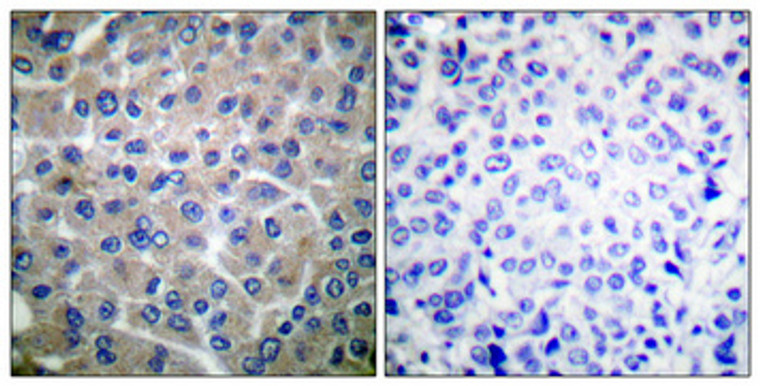| Host: |
Rabbit |
| Applications: |
WB/IHC/IF/ELISA |
| Reactivity: |
Human/Mouse/Rat |
| Note: |
STRICTLY FOR FURTHER SCIENTIFIC RESEARCH USE ONLY (RUO). MUST NOT TO BE USED IN DIAGNOSTIC OR THERAPEUTIC APPLICATIONS. |
| Short Description: |
Rabbit polyclonal antibody anti-Breast cancer anti-estrogen resistance protein 1 (376-425 aa) is suitable for use in Western Blot, Immunohistochemistry, Immunofluorescence and ELISA research applications. |
| Clonality: |
Polyclonal |
| Conjugation: |
Unconjugated |
| Isotype: |
IgG |
| Formulation: |
Liquid in PBS containing 50% Glycerol, 0.5% BSA and 0.02% Sodium Azide. |
| Purification: |
The antibody was affinity-purified from rabbit antiserum by affinity-chromatography using epitope-specific immunogen. |
| Concentration: |
1 mg/mL |
| Dilution Range: |
WB 1:500-1:2000IHC 1:100-1:300ELISA 1:5000IF 1:50-200 |
| Storage Instruction: |
Store at-20°C for up to 1 year from the date of receipt, and avoid repeat freeze-thaw cycles. |
| Gene Symbol: |
BCAR1 |
| Gene ID: |
9564 |
| Uniprot ID: |
BCAR1_HUMAN |
| Immunogen Region: |
376-425 aa |
| Specificity: |
p130 Cas Polyclonal Antibody detects endogenous levels of p130 Cas protein. |
| Immunogen: |
The antiserum was produced against synthesized peptide derived from the human p130 Cas at the amino acid range 376-425 |
| Post Translational Modifications | PTK2/FAK1 activation mediates phosphorylation at the YDYVHL motif.phosphorylation is most likely catalyzed by SRC family members. SRC-family kinases are recruited to the phosphorylated sites and can phosphorylate other tyrosine residues. Tyrosine phosphorylation is triggered by integrin-mediated adhesion of cells to the extracellular matrix. Dephosphorylated by PTPN14 at Tyr-128. Phosphorylated by SRC kinase in a EDN1- and PTK2B-mediated manner.phosphorylation strengthens its interaction with BCAR3 as part of the PTK2B/BCAR1/BCAR3/RAP1 signaling pathway. |
| Function | Docking protein which plays a central coordinating role for tyrosine kinase-based signaling related to cell adhesion. Implicated in induction of cell migration and cell branching. Involved in the BCAR3-mediated inhibition of TGFB signaling. |
| Protein Name | Breast Cancer Anti-Estrogen Resistance Protein 1Crk-Associated SubstrateCas Scaffolding Protein Family Member 1P130cas |
| Database Links | Reactome: R-HSA-186763Reactome: R-HSA-372708Reactome: R-HSA-4420097Reactome: R-HSA-8849471 |
| Cellular Localisation | Cell JunctionFocal AdhesionCytoplasmCell ProjectionAxonUnphosphorylated Form Localizes In The CytoplasmLocalizes To Focal Adhesion Sites Following Integrin Engagement |
| Alternative Antibody Names | Anti-Breast Cancer Anti-Estrogen Resistance Protein 1 antibodyAnti-Crk-Associated Substrate antibodyAnti-Cas Scaffolding Protein Family Member 1 antibodyAnti-P130cas antibodyAnti-BCAR1 antibodyAnti-CAS antibodyAnti-CASS1 antibodyAnti-CRKAS antibody |
Information sourced from Uniprot.org
12 months for antibodies. 6 months for ELISA Kits. Please see website T&Cs for further guidance










